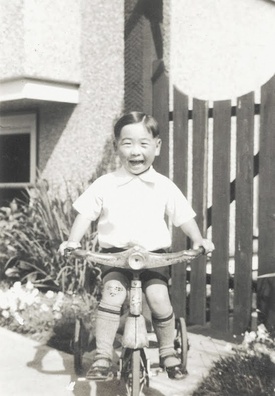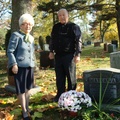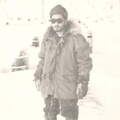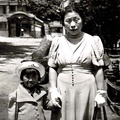Read Part 4 >>
Growing Up Nisei In Pre-WW2 Vancouver
I remember playing war games with made in Japan toy wooden knives and rifles.
In Vancouver I only had Caucasian playmates so I had to be the sneaky buck-toothed, slant-eye Jap complete with black horn-rimmed glasses all the time like in the comics and got beaten up all the time. We even bought toy buck-toothed wax upper dentures to put over our teeth! One guy brought me a set of glasses to actually wear! It was just common sense why I was always getting beat up, eh?
But at the same token, when we played cowboys and Indians, I always had to be the Indian and still got beaten up—just couldn’t win. I didn’t have to play the monkey part though as I didn’t have a tail—ha, ha, ha.
In the schoolyard at Hastings Public School and while walking home, I was called names like “Chink,” “Chinky-Chinky Chinaman,” “Monkey,” “Jap,” “Sneaky Jap,” and all the swear words adjectives before the word “Jap,” “Nip,” “slant eye;” and was pushed around by older bullies especially when I was alone.
We all used to wear leather boots that came above our ankles and boy was I ever a fast runner as I had to run away from the bullies. Mother couldn’t understand why she had to buy me new shoes every month!
You know, from the earliest time of my life, I felt like an outsider living in the suburbs as when we went over to our next door neighbour to introduce ourselves, the man told me, “Fumio?! That’s too foreign for me to remember so I’ll call you Bobby from now on.” How I hated that name from then on!
During those young days we weren’t interested in current events much. When the Daily Province newspaper arrived, we just looked at the comic strips and also bought many comic books as well and that’s how we obtained our education about life. I did however look for “Japs” news especially because I used to listen to my parents and Issei friends always talking about what’s in the news.
“Hakujin” Friends
During Vancouver days I didn’t have any JC friends as we lived out in the suburbs. My friends were all neighbour Caucasians that I met at school. I can’t even remember their names anymore and we didn’t keep in touch. There were many empty lots all around us so we played cowboys and Indians there after seeing cowboy movies. War games were fun too after reading comics and imitating the characters. All my friends brought their friends too and it got pretty rough most times. We were close to Hastings Park so we went to all the carnivals and exhibitions going on rides and playing games.
I still remember the Giant Dipper, a roller coaster, although I’ve never been on it. We could see it from the bedroom window as it slowly went up the tracks and would shoot down a steep slope really fast with everybody screaming their heads off. Almost every year some show off would take off his seat belt and stand up—right while going down, then fall off, ending his life.
We also walked over to Windermere Swimming Pool which was near the Second Narrows Bridge and on the way hundreds of crabs crossed our paths. One guy would smash a crab with a rock and then we all followed suit, even squashing them with our boots and threw them into the bushes. I couldn’t eat crabs for a long time after going through those experiences. Today, when I think about this, we had the mentality of those guys running the B.C. government. I also went swimming there with my sisters and their friends.
I didn’t know anything about human rights and what it meant to be a Canadian until we were interned and just knew that I was different, yellow and hated but I sure learned quickly later that we had NO rights at all.
When we were living in the Burnaby suburbs near Hastings Park, there was an empty lot across the street from us and roses grew wild there. When the war started “white” kids used to drag the thorny vines from there and used to pile them up in front of our front door, but one night my father ran after them and caught one of the boys. I followed Dad and he made the boy clean up the mess, talked to him and, lo and behold, he gave him a dollar. I just couldn’t believe it! From that day onward that sort of thing never happened again.
Vancouver school days

Frank riding his tricycle, still wearing his girl’s tap dancing shoes after he got home from kindergarten
I attended a special kindergarten school (all Caucasians) which specialized in teaching tap dancing also. Reason—my mother, like all mothers, used to marvel at Hiroshi’s tap dancing at Japanese school concerts (also at just about all the other JC concerts we attended) and she wanted me to become another Hiroshi. She bought me a girl’s tap dancing shoes which I strung over my shoulders (laces tied together) and every day attended classes. I was never selected to go on stages so that was the end of it, thank goodness! From grade one on, I attended Hastings Public School and just had Caucasian friends from nearby our suburban home.
After school we all had to attend a Japanese language school, Meiwa Gakuin which was located half ways towards the Powell St. J-town from our home. I think it was in Heaps District and the kids living around J-town also attended this school which was run by Mr. & Mrs. Aoki. The kids at school used to give me sugary coated, dried red coloured ginger (it was like surume, dried squid, and you can peel pieces off) and we would eat it in class and all the boys were making sounds “shee—shee—shee” because it was hot and Mrs. Aoki would confiscate all our gingers. It was really good tasting and sort of addictive. We just couldn’t play dumb and not confess as the teacher just had to look at our fingertips—all red from the red dye.
From then on, I used to take it to public school and my friends used to say, “Hunks” which meant give me some. We found a candy store close-by which carried these gingers and the same “shee-shee-shee” happened in class. They blamed it all on me and I had to go to the corner with a dunce cap on my head! After that, we only ate ginger at recess time outside.
All the games we played didn’t cost very much—marbles; alley oops—a team sport whereby a tennis ball was thrown over a roof of a small building by a team and the one who caught the ball on the other side had to come over along with his teammates to the other side and touch an enemy to earn a body for your side, that is—only if they did get tagged with the ball; pogo stick was another game; dodge ball; etc. Girls played hop scotch; Jax; skipping using two long ropes; etc.
At the Meiwa Gakuin Japanese Language School
All the kids referred to Caucasians as “ketoh” when it should be hakujin officially so I was puzzled. I heard that the word came from “ketobasu” which meant kick away. I didn’t know how to take it but I thought “bullies” would be appropriate. Whenever they felt good about the Caucasians however, they called them “Ketoh-san.” I listened more carefully to the Issei later and sure enough they were using it too so it must have derived from them? When the Issei were really mad, they called them “ketoh-meh.” They used unflattering adjectives in front also.
This was a defensive, revengeful attitude used to counter the Caucasian’s attacks toward us and hardly ever merited the official name “hakujin” except when used in newspapers, books, etc. They always showed their frustrations by uttering the 3 KKK words, “Matta Ku _ o-tare Kettoh-meh ne Ketto-basarete, shimaida.” It was quite mild,—“again we got it from those xxxxx bullies like always.” To me it now sounds like how the American Blacks were treated by the Klu Klux Klan. I often thought that the Japanese language was very clean as I didn’t know many swear words and if there were some they were very mild ones. I never asked Mom or Dad for an explanation for obvious reasons.
You know, the word “Japs” was a terribly hateful word we heard often long before the war and we showed deep resentment against it as there were always negative, foul adjectives in front of that word and it hurt us so badly to a point where we were paranoid about it when we heard it or saw it in bold letters in comics, newspapers, and magazines—and, it continued on and on for a long time from the earliest days I can remember! It really showed the racial hatred to the maximum. Whenever I hear it today, it still hurts. It just freezes me to a standstill because it’s deeply engraved into me and reminds me of the old Vancouver days.
Talking about Hiroshi, who later became a celebrity actor on a TV series and movies, he sat beside me at Japanese school (he lived around J-town). At the back of the school playground there was an open space behind the bushes and the older boys used to lure us over to play dodgeball and they would stick all us little guys in the center and played normally at first. The game would get rougher and rougher as it progressed and the older guys would start bullying us and more or less used us little guys as the ball. When this would start happening I ran away always as I was a quick runner and they couldn’t catch me. Most times the bullies picked on Hiroshi and he would come in late to class, all covered in dirt crying and would sit beside me. I remember Mrs. Aoki consoling him and taking him to the washroom to clean him up.
During the Vancouver and Internment days, the Issei, including my mother always preached to us to never bring shame to the family and the JC community. Whenever they heard good accomplishments about JCs from friends or through the newspaper, mother would always let us know and put them on a pedestal and praise them. They all looked up to people with academic standings and addressed them with “sensei”—teacher! Sensei was always put on a higher pedestal than non-academic heroes.
Putting people on pedestals was good and bad and I think it must have made those older boys jealous or to hate Hiroshi due to the pressures put on them by their parents and thus caused the bullying. They always say that “boys will be boys” but not in Hiroshi’s case.
© 2013 Frank Maikawa





